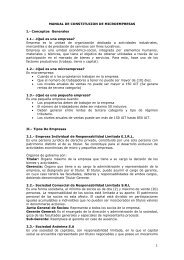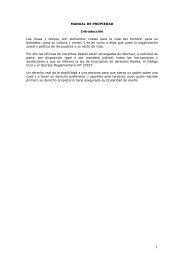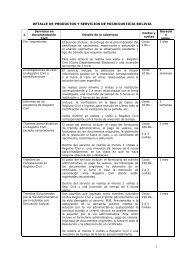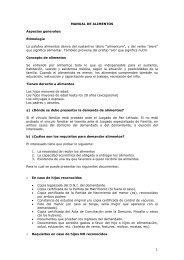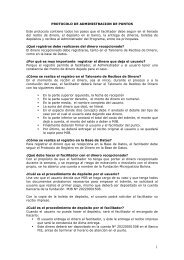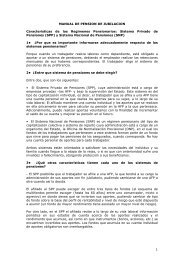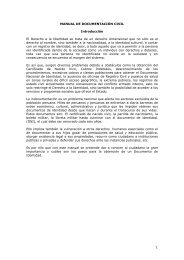ICISS report - International Coalition for the Responsibility to Protect
ICISS report - International Coalition for the Responsibility to Protect
ICISS report - International Coalition for the Responsibility to Protect
Create successful ePaper yourself
Turn your PDF publications into a flip-book with our unique Google optimized e-Paper software.
The <strong>Responsibility</strong> <strong>to</strong> <strong>Protect</strong> 51<br />
Legitimacy and <strong>the</strong> Ve<strong>to</strong><br />
6.19 A common <strong>the</strong>me in a great many of <strong>the</strong> Commission’s consultations was <strong>the</strong><br />
democratic legitimacy of <strong>the</strong> fifteen-member Security Council, which can hardly claim <strong>to</strong> be<br />
representative of <strong>the</strong> realities of <strong>the</strong> modern era so long as it excludes from permanent<br />
membership countries of major size and influence, in particular from Africa, Asia and Latin<br />
America. The Security Council was also variously claimed <strong>to</strong> be nei<strong>the</strong>r answerable <strong>to</strong> <strong>the</strong><br />
peoples of <strong>the</strong> world, nor accountable <strong>to</strong> <strong>the</strong> plenary General Assembly nor subject <strong>to</strong><br />
juridical supervision and scrutiny. There is no doubt that re<strong>for</strong>m of <strong>the</strong> Security Council, in<br />
particular <strong>to</strong> broaden and make more genuinely representative its composition, would help<br />
in building its credibility and authority – though not necessarily making <strong>the</strong> decision<br />
making process any easier. But this is not a debate in<strong>to</strong> which this Commission need enter<br />
<strong>for</strong> <strong>the</strong> purposes of this <strong>report</strong>.<br />
6.20 An issue which we cannot avoid addressing, however, is that of <strong>the</strong> ve<strong>to</strong> power enjoyed<br />
by <strong>the</strong> present Permanent Five. Many of our interlocu<strong>to</strong>rs regarded capricious use of <strong>the</strong> ve<strong>to</strong>,<br />
or threat of its use, as likely <strong>to</strong> be <strong>the</strong> principal obstacle <strong>to</strong> effective international action in<br />
cases where quick and decisive action is needed <strong>to</strong> s<strong>to</strong>p or avert a significant humanitarian<br />
crisis. As has been said, it is unconscionable that one ve<strong>to</strong> can override <strong>the</strong> rest of humanity<br />
on matters of grave humanitarian concern. Of particular concern is <strong>the</strong> possibility that<br />
needed action will be held hostage <strong>to</strong> unrelated concerns of one or more of <strong>the</strong> permanent<br />
members – a situation that has <strong>to</strong>o frequently occurred in <strong>the</strong> past. There is ano<strong>the</strong>r political<br />
problem. Those states who insist on <strong>the</strong> right <strong>to</strong> retaining permanent membership of <strong>the</strong> UN<br />
Security Council and <strong>the</strong> resulting ve<strong>to</strong> power, are in a difficult position when <strong>the</strong>y claim <strong>to</strong><br />
be entitled <strong>to</strong> act outside <strong>the</strong> UN framework as a result of <strong>the</strong> Council being paralyzed by a<br />
ve<strong>to</strong> cast by ano<strong>the</strong>r permanent member. That is, those who insist on keeping <strong>the</strong> existing<br />
rules of <strong>the</strong> game unchanged have a correspondingly less compelling claim <strong>to</strong> rejecting any<br />
specific outcome when <strong>the</strong> game is played by those very rules.<br />
6.21 For all <strong>the</strong>se reasons, <strong>the</strong> Commission supports <strong>the</strong> proposal put <strong>to</strong> us in an<br />
explora<strong>to</strong>ry way by a senior representative of one of <strong>the</strong> Permanent Five countries, that <strong>the</strong>re<br />
be agreed by <strong>the</strong> Permanent Five a “code of conduct” <strong>for</strong> <strong>the</strong> use of <strong>the</strong> ve<strong>to</strong> with respect <strong>to</strong><br />
actions that are needed <strong>to</strong> s<strong>to</strong>p or avert a significant humanitarian crisis. The idea essentially<br />
is that a permanent member, in matters where its vital national interests were not<br />
claimed <strong>to</strong> be involved, would not use its ve<strong>to</strong> <strong>to</strong> obstruct <strong>the</strong> passage of what would<br />
o<strong>the</strong>rwise be a majority resolution. The expression “constructive abstention” has been used<br />
in this context in <strong>the</strong> past. It is unrealistic <strong>to</strong> imagine any amendment of <strong>the</strong> Charter<br />
happening any time soon so far as <strong>the</strong> ve<strong>to</strong> power and its distribution are concerned. But<br />
<strong>the</strong> adoption by <strong>the</strong> permanent members of a more <strong>for</strong>mal, mutually agreed practice <strong>to</strong><br />
govern <strong>the</strong>se situations in <strong>the</strong> future would be a very healthy development.<br />
Political Will and Per<strong>for</strong>mance<br />
6.22 The Commission recalls <strong>the</strong> Secretary-General’s warning that “If <strong>the</strong> collective<br />
conscience of humanity … cannot find in <strong>the</strong> United Nations its greatest tribune, <strong>the</strong>re is a<br />
grave danger that it will look elsewhere <strong>for</strong> peace and <strong>for</strong> justice.” If <strong>the</strong> Council – and <strong>the</strong><br />
five permanent members in particular – fail <strong>to</strong> make <strong>the</strong> Council relevant <strong>to</strong> <strong>the</strong> critical<br />
issues of <strong>the</strong> day <strong>the</strong>n <strong>the</strong>y can only expect that <strong>the</strong> Council will diminish in significance,<br />
stature and authority.



